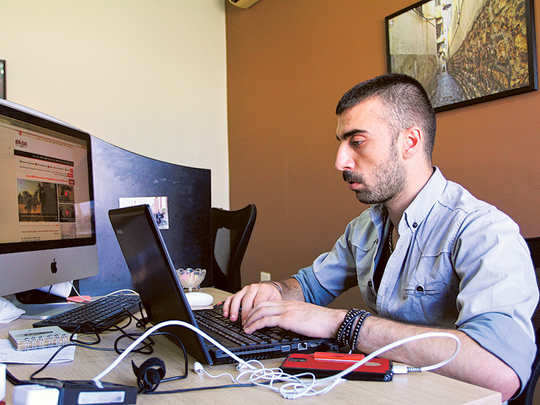
Amman: From a small office in Jordan’s capital, two dozen Syrians and Americans talk daily by Skype with activists and civilians on both sides of the conflict in neighbouring Syria to get a unique perspective on the civil war and the scope of the suffering.
The set-up of Syria Direct, a US-funded non-profit group, is similar to that of news organisations that cover the conflict largely from a distance because on-the-ground reporting in Syria is either restricted or deemed too dangerous.
Yet Syria Direct also has a goal beyond reporting — it wants to influence decision-makers.
“What we’re trying to do is talk about ordinary Syrians and what their daily life is like after the decisions are made,” said managing director Orion Wilcox.
Syria Direct is funded by the US State Department and a US charity, but Wilcox said money from Washington does not influence what is published. The group writes about abuses by both the government of Syrian President Bashar Al Assad and rebel groups fighting him, he said.
Remote coverage of the five-year-old war, which devastated large parts of Syria, killed more than a quarter of a million people and uprooted millions more, has been a major challenge. Information is often difficult to obtain or vet. At the same time, global interest in the daily bloody grind in Syria has dropped off as other crises command attention.
Syria Direct said it is targeting readers who are already well informed about Syria and want a more granular view than what most news outlets typically provide. The website has about 50,000 page views per month, while its Facebook page has 77,000 followers. Both are published in English and Arabic.
In the group’s Amman office, two dozen Syrian and American journalists, translators and trainees met in small groups on a recent morning to discuss story ideas.
Two or three pitches are usually pursued per day, with Syrian journalists tapping into their network of sources to gather information.
Stories reported and written by the Syrian journalists in Arabic are translated to English, then fact-checked and edited before being translated back to Arabic.
A recent story reported on the rise of miscarriages in rebel-held Madaya, one of four Syrian towns where the UN says over 62,000 people are besieged in rapidly deteriorating conditions. As part of the story, Syria Direct interviewed a Madaya woman who said she suffered a miscarriage after UN food aid stopped coming.
“We have sources that we’ve worked with for a long time and know are reliable,” said Syrian journalist Mohammad Al Haj Ali, who fled to Amman in 2012. “When we hear news ... we check the news with several eyewitnesses.”
When hundreds in a rebel-controlled suburb of Damascus suffered from food poisoning in June, Syria Direct spoke to residents who said the cause was spoiled food distributed by a rebel-administered charity.
Eliot Higgins, a British blogger and Syria watcher, said he considers Syria Direct a reliable news source — within the limitations of remote coverage.
“You’re getting stuff that people choose to share, so it’s not always representative of the entire conflict or what’s going on in a certain area,” he said.
Higgins said some pro-government groups have claimed Syria Direct focuses more on abuses committed by the government than by rebel groups, but that this may in part be due to greater media savviness and social media presence of the Syrian opposition groups.
Syria Direct co-founder Amjad Tadros, a veteran news producer for the US network CBS, said the group covers all sides of the conflict. “From the opposition, to the government, to the Kurds, they all insult us because we tell the truth,” he said.
For example, supporters of one Kurdish group criticised Syria Direct on Twitter after it reported that a Kurdish militia had forcibly displaced Syrian Arabs from their homes. And a recent story about rebels trying to break a government blockade in the city of Aleppo quoted an opposition commander and a pro-government source.
Syria Direct was set up in 2013 by Tadros and the private US-based group Global Peace and Development Charitable Trust, which says on its website that it seeks to promote democracy worldwide.
The trust and the State Department cover the running costs and the training of journalists. The US Embassy in Jordan said the US government does not interfere in editorial decisions.
Syria expert Joshua Landis said reporters at Syria Direct fill a need by tapping into their networks and providing relatively nuanced reports about multiple players in a fragmented country.
“What we really suffer from is a lack of perspective ... of different groups on the ground,” said Landis, a professor at the University of Oklahoma. “Syria Direct does provide some of that.”












